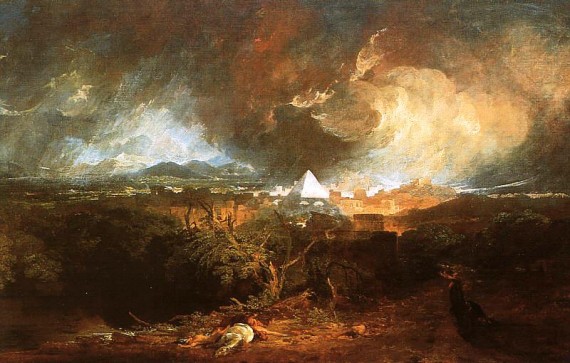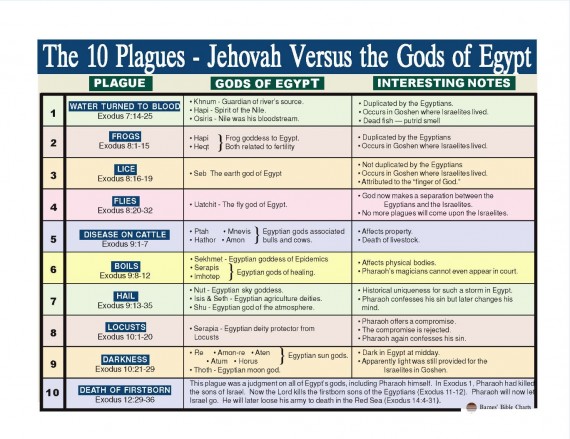The ten plagues were the means by which the people of Israel gained freedom from slavery in Egypt.
While some scholars argue that the first nine plagues were non-violent, it is impossible to say that they were non-destructive. Even if it could be proved that no human died in any of the first nine plagues, it is nearly certain that countless fish, frogs, animals, and insects died over the course of these nine plagues. For example, it is quite unlikely that any fish survived the first plague—the turning of the water of the Nile into blood. The same goes for the disease on the cattle (the fifth plague), and the hail and fire of the seventh plague.

Nevertheless, as we seek to understand the violence of God in the Old Testament in light of Jesus Christ, it is the tenth plague that is of primary importance for this study, for it this plague which killed all the firstborn sons of Egypt.
The Ten Plagues and the Impotence of Egyptian Deities
However, before we consider the events of the tenth plague, it is important to recognize that all the ten plagues were at their core an attack on the powers of the Egyptian deities (cf. Gen 12:12).
The plagues were designed to show the impotence of the Egyptian idols, the supremacy of God’s power and the futility of resisting His declare will. The plagues also showed His mercy, being tailored to disrupt and humiliate the worship of their pagan deities without causing loss of human life until the final plague, which occurred only after God had exhausted every other option (Graeser, et. al, Don’t Blame God, 74).
- The first plague, turning water into blood, revealed the impotence of Khnum, the guardian of the river, Hapi, the spirit of the Nile, and Osiris, whose blood was the Nile.
- The second plague, the frogs, revealed the impotence of Hapi and Heket, who were symbolized by frogs and were related to Egyptian fertility rites.
- The third plague, that of lice, revealed the impotence of Seb, the earth god.
- The fourth plague, that of flies, revealed the impotence of Uatchit, the god of flies.
- The fifth plague, the disease on cattle, revealed the impotence of Ptah, Mnevis, Hathor, and Amon, Egyptian gods associated with bulls and cows.
- The sixth plague, the plague of boils, revealed the impotence of Sekhmet, the goddess of epidemics, and Imhotep, the god of healing.
- The seventh plague, the hail mixed with fire, revealed the impotence of Nut, the sky goddess, Isis and Seth, Egyptian agricultural deities, and Shu, the god of the atmosphere, weather, and sky.
- The eighth plague, the swarms of locusts, revealed the impotence of Serapia, the deity who was to protect Egypt from locusts.
- The ninth plague, that of darkness, revealed the impotence of Re, Amon-re, Aten, Atum, and Horus, all of who were related to the sun.
- Finally, the tenth plague, the death of the firstborn sons of Egypt, revealed the impotence of Pharaoh himself, who was worshiped as a deity in Egypt.
Note: For a great chart on these Egyptian deities and their relation to the Ten Plagues, see Barnes’ Bible Charts on the Plagues.
Tomorrow we will begin to look at how to read and understand the tenth plague in light of Jesus Christ. Until then, have you heard this perspective about the ten plagues revealing the impotence of the Egyptian deities? What are your thoughts about it?
 How can a God who says "Love your enemies" (Matthew 5:44) be the same God who instructs His people in the Old Testament to kill their enemies?
How can a God who says "Love your enemies" (Matthew 5:44) be the same God who instructs His people in the Old Testament to kill their enemies?
These are the sorts of questions we discuss and (try to) answer in my online discipleship group. Members of the group can also take ALL of my online courses (Valued at over $1000) at no charge. Learn more here: Join the RedeemingGod.com Discipleship Group I can't wait to hear what you have to say, and how we can help you better understand God and learn to live like Him in this world!



Nice point, that this was a judgement on their belief system and their trust in it rather than judgement upon themselves.
Right. God was showing them that He was God and their deities were not.
Fascinating bit of historical/cultural context. I’d never heard that about the plagues attacking the Egyptian deities before you told me about it.
I think it is mentioned in some commentaries I own, but didn’t have time to research it in more detail right now. Sorry!
This perspective really changes people’s view of the plagues: suddenly God isn’t picking on the Egyptians for nothing (oppression and infanticide of Hebrews aside), but it’s really a battle of the gods.
When Moses first approaches Pharoah, the response is arrogant and along the lines of “God, who’s that?”. When God first approaches Moses, he has to ask who He is so he has something to take back to his own people. It’s a fairly safe bet that not too many remember even who God is, let alone his status as God above all gods.
God Himself says it when he tells Moses that he will do it to make His Name known (again).
So a strategy of putting all the Egyptian gods (including Pharaoh) in their place seems to have been the way to go. If the Egyptian Gods were as great as believed, none of the plagues could have happened. You have to look at it with a totally different mindset to the one most of us use to see our current world.
I love how you describe it, Cathy. Yes, it was a battle of the gods. Very similar to what happened with Elijah and the priests of Baal on Mt. Carmel in 1 Kings 18.
I’m sorry, it seems all of the plagues could have been avoided. According to my Bible, The New King James Version, God told Moses that He was going to harden Pharoahs heart and then He did. God also at the end of the plagues predisposed the people of Egypt to look favorably on the Israelites and gave them gold, silver and linens. Why not, soften Pharoahs heart in the beginning and stop the carnage?
Yes, good questions. Why not indeed? Even if we could argue that no human died during the first nine plagues (probably not a likely assumption), there was still a lot of animal carnage.
yes God knows what he’s doing we just think we do. I studied this for a while and now there’s charts a lot which is great basically God was taking sniper shots at their faults gods to show Israel and Egypt who is the real God. Any God you worship is standing for Satan Marshall if you want to worship The Rock I demon will sign his self to that rock to get the worship that’s the reason you don’t say Ava Lusk and St Peter’s Basilica and Rome ways if you know what the Bible says , you don’t
a possible interpretation of the hardening of pharaoh’s heart is based on an old egyptian belief of “the weighing of the hearts”. The belief basically goes as there is a ritual in the afterlife where the deceased would have their hearts weighed on a scale against a feather. If their hearts were heavy with guilt and sin then the scale would tip and their being would be destroyed, but if their heart was innocent and light then the scale would not tip and they would go onto the afterlife. This could be a referance to that belief and God could be simply saying “I know all and therefore I know that Pharaoh will not let my people go unless I do these things, but because he is against me I will (in a sense) harden his heart on my scale and he will not be in my afterlife. He will not go to Heaven because he opposes Yahweh”. Archaeology brings us more understanding to cultures and how they might fit with the bible. This one seems to fit quite well in this context. Tell me if it helped explain your question at all. Also what a better way to show his power and divinity than to take out all the gods of the world power at the time?
If you’ll notice, the first 3 times it says, “Pharaoh hardened his heart.” Punishment has a way of either softening or hardening someone, and it depends more on the heart of the person than it does on the type of punishment. Nebuchadnezzar was also punished in a “harsh” (and kinda weird) way, yet instead of being hardened, he turned to worship God.
Hebrews 10 brings this out, reminding God’s children that if we despise His chastening and harden our hearts, then we are essentially rejecting Him as our Father.
So God used a wicked Pharaoh to reject His punishment (Rom. 9:17). If you think about it, God also used Satan to put Jesus on the cross to bring about the salvation of the world.
“The same sun which melts wax hardens clay. And the same Gospel which melts some persons to repentance hardens others in their sins” – Spurgeon
-So the same God who melts our hearts with His word hardens others with that same word… because they refuse to hear His message!
Who would justify killing children to demonstrate their powers ?
Lee you could argue that what the egyptians had done to the isrealites came back on them it was there idea of killing the male babies to control the population. Moses also warned them first what would happen if they disobeyed it was there choice to repent or to act in there own strength.In regard to the last statement the Government justifys it by saying that it is the mother has the right to abort her children.
Jeremy great research on the Egyptian Gods that made it all make sense really hits the message that there is but one supreme God.
My thought process about the purpose behind God “hardening of Pharaoh’s heart” is because God wasn’t trying to just free the Hebrew people. He was also trying to make himself known to the Egyptian people. He say over and over that the plagues came that by this you will know that I am THE LORD. (Ex 7:17, 8:10,22,9:14,29, etc-8 times in total he says something similar) If Pharaoh was compliant, the Egyptians would not have had the opportunity to choose God. God was evangelizing!
And in response the those who think God is being a meany by killing babies and Egyptians, as a woman who has lost many children, through both miscarriage and tragedy, I can tell you the only comfort I find some days is that my children who have died are in heaven away from the difficulties of this world. Death is the victory! Six children in heaven, only two to go!!! What a burden I carry every day for those two who have to slog through this broken world an still maintain their faith.
Can you tell me if the Barnes Bible Chart you site is reproducible or is there licensing that I need to do so?
Thank you!
Yes! Thank you Exodus 12:12 sums it all up, “…I will execute judgment against ALL the gods of Egypt, exhibiting their worthlessness, I am the LORD”
The bible is not a history book and neither are the 10 plagues. The question is why those 10 plagues and why in that order? The story is describing the transformation we will have to go through to evolve. The first plague (turning water into blood) is the same story as Jesus changing water into wine. The last plague is the death of our lower self. Can you fill in the rest?